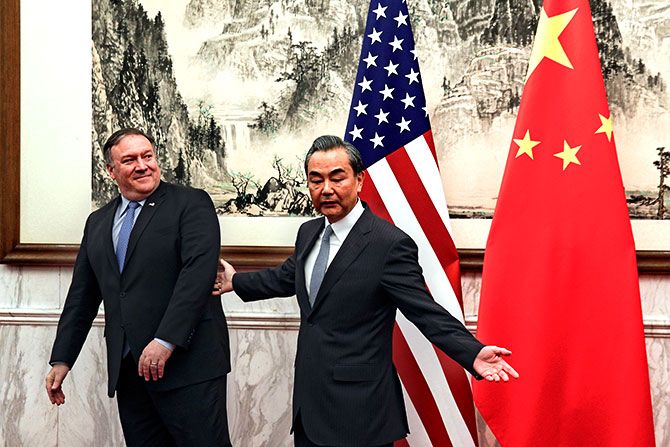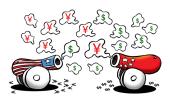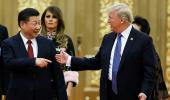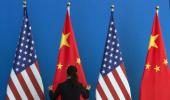'This is a high-stakes strategic conflict between a power which wants to preserve the status quo in its favour and one which wants to usurp that throne.'
'The rest is all theatre,' says Harsh V Pant.

It is a full-on trade war between two of the mightiest global powers and both sides are trying to play hardball.
After imposing tariffs on $34 billion worth of Chinese goods in July, US President Donald J Trump ratcheted up the pressure by going in for another $16 billion worth last month and ordering his administration to prepare to collect tariffs on $200 billion of Chinese trade on top of that.
China has responded with its own set of reciprocal sanctions on the US products.
There is a possibility that the two sides are getting ready for talks but ahead of those talks, President Trump is planning to impose a fresh round of tariffs on Chinese products to increase pressure on Beijing.
Mr Trump has long accused China of unfair trade practices such as subsidies, currency manipulation and, in particular, of stealing American intellectual property in the form of cutting-edge technology.
Against this backdrop, Chinese President Xi Jinping's flagship 'Made in China 2025 initiative is viewed with suspicion as it is aimed at strengthening Chinese foothold in key industrial sectors, including pharmaceutical products, aircraft and robotics.
This is reflected in the US trade representative's description of the initiative as part of a plan of 'seizing economic dominance of certain advanced technology sectors.'
While one can view these developments as a function of President Trump's worldview, there is a wider shift happening in the US in so far as China is concerned.
There is a fundamental re-evaluation of America's China policy going on at the moment with questions being raised about the nation's past posture.
As a 2017 report from the US trade representative to the US Congress underscores: 'It seems clear that the United States erred in supporting China's entry into the WTO on terms that have proven to be ineffective in securing China's embrace of an open, market-oriented trade regime.'
These concerns about China's economic behaviour are not America's alone. A number of other leading trade powers, including the European Union, share these concerns.
The EU, for example, has been asking China to deal with its excess steel and aluminium capacity, and has even complained to the WTO about the theft of intellectual property and high-end technology.
Foreign companies wanting to operate in China have to work with a Chinese partner in a way that means they can easily lose control of their technology. But the EU has refrained from unilaterally imposing additional trade barriers on China like the Trump administration.
While China has responded with a tit-for-tat approach in retaliating against the US, the future will be difficult for Beijing because China imports much less from the US than it exports there.
There have been reports about the growing criticism of Xi in China as the future economic prospects of the country look tough.
Since the end of the Cold War, the American strategy vis-a-vis China was premised on the assumption that the more the US engages China, the faster China would become more like the US and emerge a responsible stakeholder in managing a global order set by the US and its allies after the end of the Second World War.
But this strategy has a fatal flaw: Major powers react to their own set of structural incentives, they don't necessarily respond to the assumptions underpinning the policies of their competitors.
The US policy critically underestimated the resolve of the Chinese Communist party to maintain its position in the nation's domestic politics and its will to global power.
This will has been repeatedly manifest in the Chinese behaviour on issues from East and South China Seas to the Belt and Road Initiative and China's military build-up.
Where in the beginning, Chinese leaders were cautious in challenging the US for global hegemony, there is now a real sense in Beijing of having arrived and it wants the global order to reflect its interests and values.
This is well recognised in the US today.
As compared to the past, there is now a greater awareness of how China has manipulated the international system to serve its agenda. And so the pushback on the economic front is the first major attempt to redirect US-China ties.
In global relations, economic order rests on the political order.
Under the garb of a trade war, this is a high-stakes strategic conflict between a power which wants to preserve the status quo in its favour and one which wants to usurp that throne.
The rest is all theatre!
Harsh V Pant is Director, Studies, Observer Research Foundation, New Delhi, and Professor of International Relations at King's College, London.











